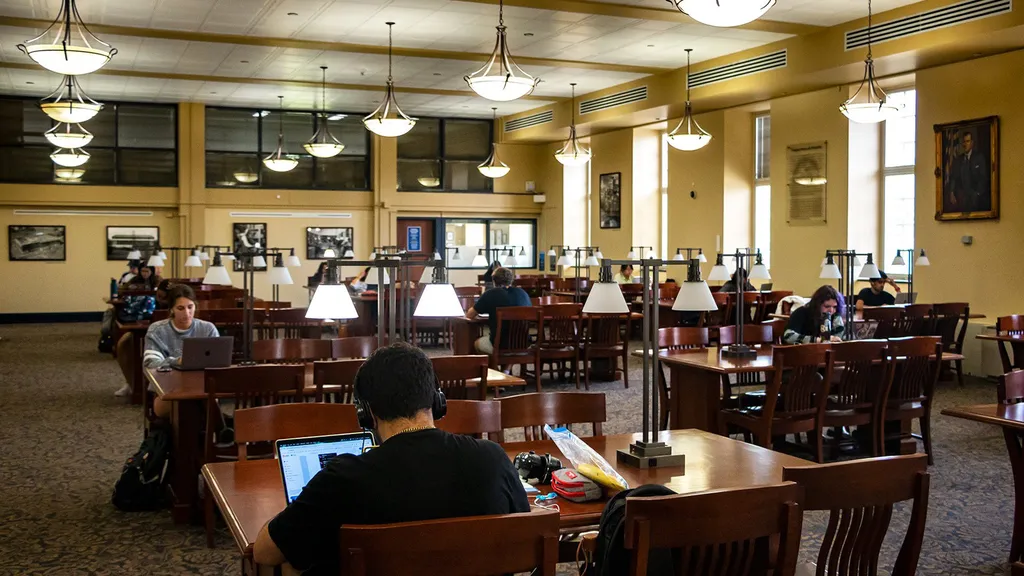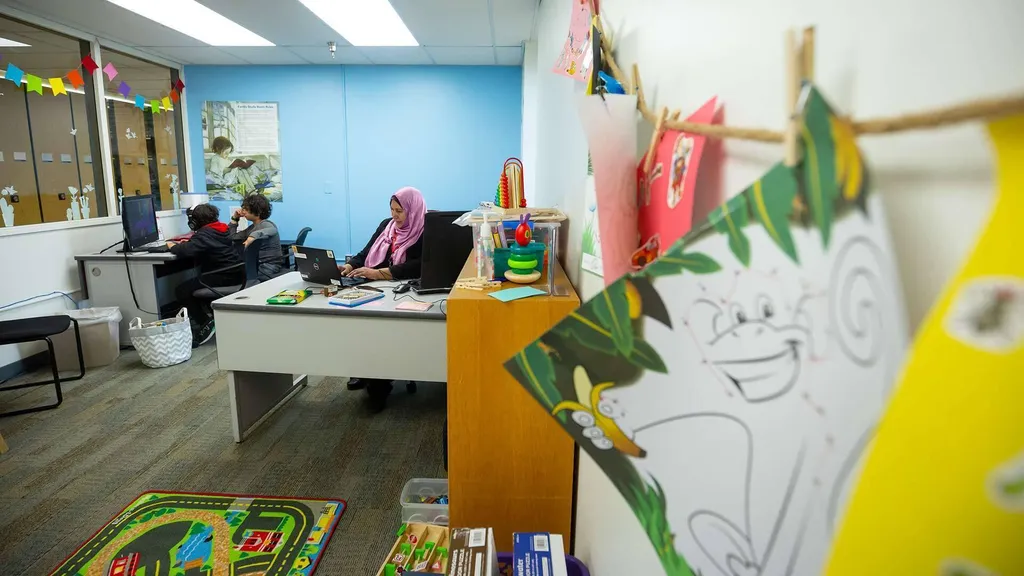- September 13, 2022
- By University Libraries Staff
If a university library conjures images of students studying individually in a quiet, stately setting reminiscent of the Oxford one featured in Harry Potter movies, try broadening your thinking.

While the University of Maryland’s Libraries does have a reading room—a space in McKeldin Library adorned with hardwood furniture and chandeliers that students affectionately call the “Hogwarts Room”—it has added many other services and collaborative spaces across campus to support student engagement and success.
Visit McKeldin or the other campus libraries—Hornbake Library (home of Special Collections and University Archives), STEM Library, Michelle Smith Performing Arts Library, Art Library and the Architecture Library—in person or online, and check out some of the information right here:
Spaces That Work
Located on the second floor, the Terrapin Learning Commons (TLC) is the action hub of McKeldin, with group study rooms and technology-packed spaces to collaborate and get work done. At the TLC Technology Desk, students can borrow laptops, recording equipment, chargers, headphones and more. It also offers large-format poster printing, binding and lamination; a Podcasting Lab; and a Memory Lab, a self-service space to digitize “legacy media” like VHS, audio cassettes and 35mm slides.
The John and Stella Graves Makerspace on the first floor in the STEM Library in Kirwan Hall offers access to 3D printing and augmented and virtual reality tools, featuring an augmented reality “sandbox” for mapping and other projects.
Also at McKeldin: The Writing Center offers dedicated hours in the Libraries, working closely with librarians to help undergraduates improve their writing skills, while the Graduate Student Writing Center assists with writing research papers, articles, theses and dissertations.
Caring for the Whole Student
The Libraries regularly collaborate with student organizations and campus partners to give students a break from their rigorous academic pursuits. The University Health Center’s Wags for Wellness pet therapy program frequently hosts time in McKeldin Library for students to destress.

Beyond books and technology equipment, students can check out fitness equipment like resistance bands, yoga mats and exercise ball chairs, as well as light therapy lamps to help maintain their physical and emotional well-being.
The McKeldin Family Study Room offers an area for caregivers to study alongside little ones without the need for costly child care. The room is equipped with computer workstations and desks, child-sized furniture, children’s books and toys for one family at a time.
An alcove on the southwest side of the third floor was renovated in 2020 as the Reflection Room, thanks to the Student Facilities Fund, for students looking for a quiet place to meditate, reflect or pray. It’s not for sleeping, but another project supported by the Student Facilities Fund is: two napping pods on the first floor of McKeldin Library. Unsurprisingly, they’re popular with students.
Supporting Student-powered Research
In Research Education@University Libraries, subject librarians work closely with students on advanced research methods, bibliographic management tools, copyright and publishing support, writing bootcamps, posters for conference presentations, and the archiving and dissemination of research findings.
The Statistical Consulting Service in the STEM Library advises students on selecting and using tools and software and guidance in interpreting their research findings, while the GIS and Spatial Data Center on the sixth floor of McKeldin teaches students how to use geographic information system (GIS) software and visually present their findings.
The REP also offers a variety of workshops, many in consultation with the Graduate Student Writing Center, with sessions such as “How to Write a Literature Review” and “Writing with Sources.” Its other programs also contribute to the intellectual climate on campus, including Interdisciplinary Dialogue Series and Speaking of Books: Conversations with Campus Authors.
Addressing College Affordability
Through the Top Textbooks program, based at the McKeldin Library service desk, the UMD Libraries every semester provides textbooks for approximately 100 of the university’s largest courses. Students may borrow them for four hours at a time. Between Fall 2015 and Fall 2021, nearly 11,000 students took advantage, for a total potential savings exceeding $1.44 million.
The Libraries also helps faculty provide other materials that students need, including ebooks, articles and streaming media, via the Course Reserves Program.
Partnering for Academic Success
Subject specialist librarians are available in all branches for one-on-one research assistance as well as via online chat, Monday-Friday. In three technology-rich classrooms in McKeldin, they also provide interactive lessons for the Professional Writing Program and subject-specific courses.
They cover topics such as how to find and evaluate information, navigate the research process, use research tools and adhere to academic integrity. Around 20,000 students are taught through this program each year.
Topics
Campus & CommunityUnits
University Libraries